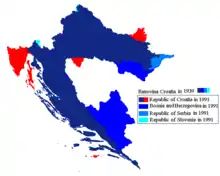Croatian question
The Croatian question (Croatian: Hrvatsko pitanje) refers to a political, cultural, social and economical status of Croats in Austro-Hungary, Kingdom of Yugoslavia, SFR Yugoslavia and post-Dayton Bosnia and Herzegovina.

The first steps towards Croat home rule were made in 1939 with the Cvetković–Maček Agreement, creating the autonomous Banovina of Croatia. This province, mostly coterminous with the former Sava and Littoral Banovinas with the exception of a few other Croat-majority regions, lasted until the WWII Invasion of Yugoslavia, with the Independent State of Croatia being established as a Nazi puppet state 10 April 1941.
In post-WWII Yugoslavia, the Croatian national question was mostly resolved on June 25, 1991 with the creation of independent Republic of Croatia from the territory of the constituent SR Croatia.
Sources
- Banac, Ivo (2015). The National Question in Yugoslavia: Origins, History, Politics. Cornell University Press. ISBN 9781501701931.